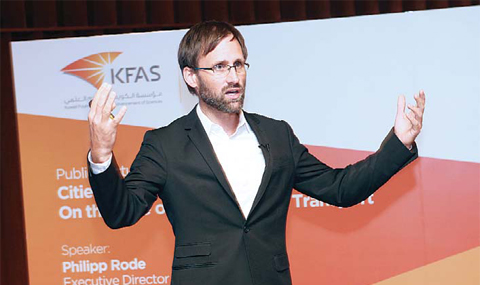 Philipp Rode, Executive Director of the London School of Economics Cities
Philipp Rode, Executive Director of the London School of Economics Citiesand senior research fellow at LSE. —Photos by Yasser Al-Zayyat
KUWAIT: It has been repeatedly argued that cities have a unique opportunity to build a different model of economic growth - one which achieves the benefits of growth but with significantly reduced greenhouse gas emissions alongside co-benefits such as improved health. And it is commonly understood that this will require a focus on actions that are systematically important for how cities function including decisions around urban form, city design and transport.
In partnership with the London School of Economics, Kuwait Foundation for the Advancement of Sciences (KFAS) hosted on Tuesday at Al-Shaheed Park a lecture based on research by the Global Commission on the Economy and Climate. The lecture entitled "Cities and the new climate economy: On the role of urban form and transport" was presented by Philipp Rode, Executive Director of the London School of Economics Cities and senior research fellow at LSE.
Rode spoke about achieving high-quality, resilient and inclusive economic growth while reducing the risks of climate change. The research aims to drive action by world leaders, business executives and investors ahead of a major summit on climate change. "The decisions we make now will determine the future of our economy and our climate. If we choose low-carbon investment, we can generate strong, high-quality growth - not just in the future, but now. But if we continue down the high-carbon route, climate change will bring severe risks to long-term prosperity," he said.
Better Growth, Better Climate: The New Climate Economy Report was presented to governments and business and finance leaders at a global launch event at the UN headquarters in New York City, attended by United Nations Secretary General Ban Ki-Moon. The report arrives just one week before the UN Climate Summit.
The report finds that there are now major opportunities to achieve strong growth with lower emissions in three key sectors of the global economy - cities, land use and energy. To achieve this growth, governments and businesses need to improve resource efficiency, invest in good-quality infrastructure, and stimulate technological and business innovation.
Rode reviewed the recommendations of the global commission. Better urbanization: We have to make better planned urban development a central element of national economic development strategies. And we must consider greater fiscal autonomy for cities to unleash investment in smarter urban infrastructure. Price externalities: Eliminate fuel subsidies and other subsidies and introduce mechanisms to price externalities such as traffic congestion.
Redirect investment: Redirect existing infrastructure funding towards more compact, connected and coordinated urban infrastructure. Planning and governance: strengthen role of strategic planning at national, regional, and city levels incl. setting up integrated land use and transport authorities. Financing models: Work in partnership with the private sector at new funding vehicles to unlock capital for mass transit and other smarter infrastructure.
The NCE Cities Research Program is led by LSE Cities at the London School of Economics. The program includes a consortium of researchers from the Stockholm Environment Institute, the ESRC Centre for Climate Change Economics and Policy, the World Resources Institute, Victoria Transport Policy Institute, and Oxford Economics. The NCE Cities Research Program is directed by Graham Floater and Rode. ABSTRACT Urbanisation is one of the most important drivers of productivity and growth in the global economy.
Between 2014 and 2050, the urban population is projected to increase by around 2.5 billion people, reaching 66 percent of the global population. By 2030, China's cities alone will be home to nearly 1 billion people. India, Nigeria and Indonesia will also experience rapid population growth. If managed well, the potential benefits of this urban growth are substantial.
The economic potential is driven by raised productivity resulting from the concentration of people and economic activities in cities that leads to a vibrant market and fertile environment for innovation in ideas, technologies and processes. Similarly, well-managed cities in high income countries could continue to concentrate national economic growth, through re-densification and the roll out of innovative infrastructure and technologies.
By Faten Omar










